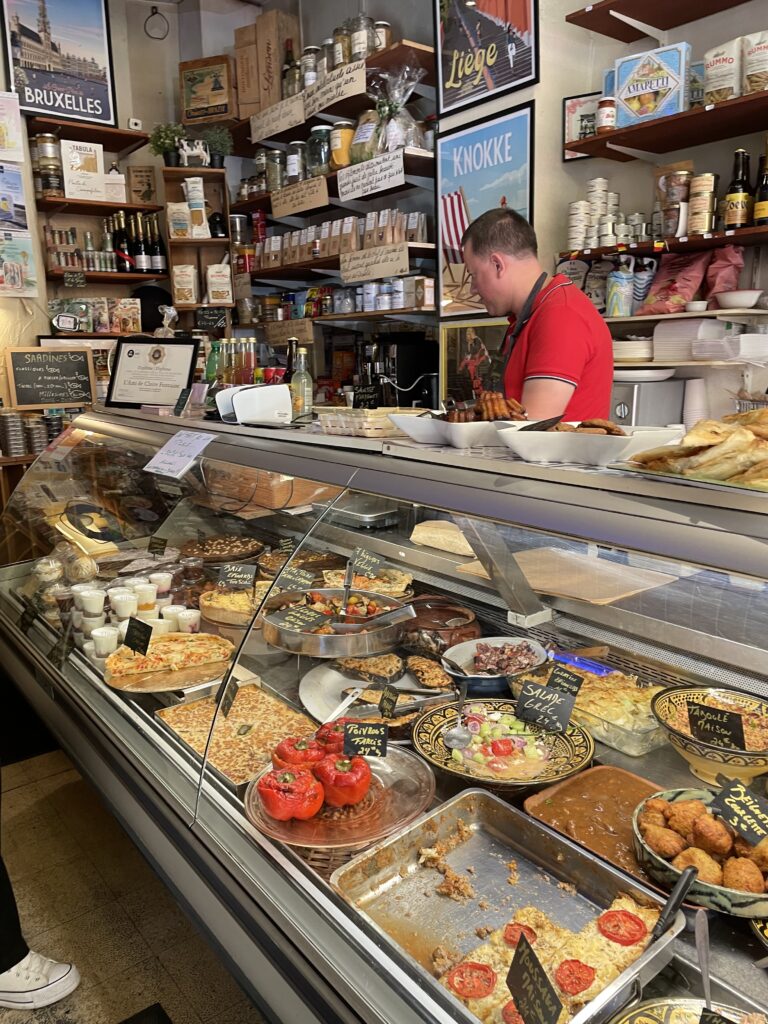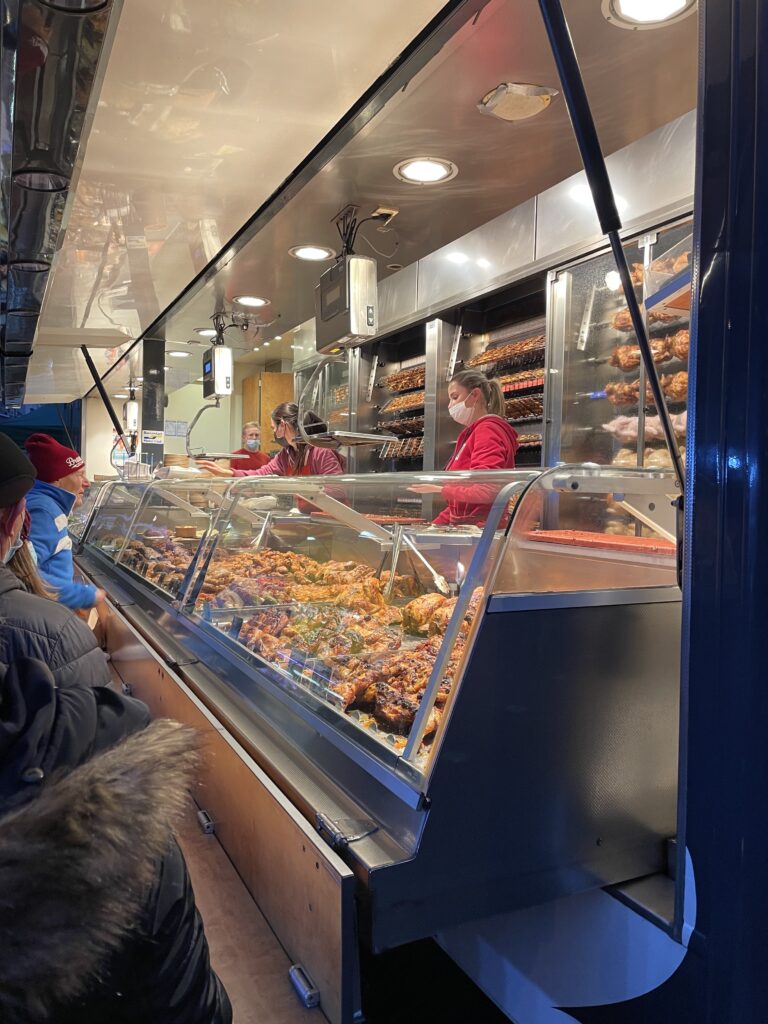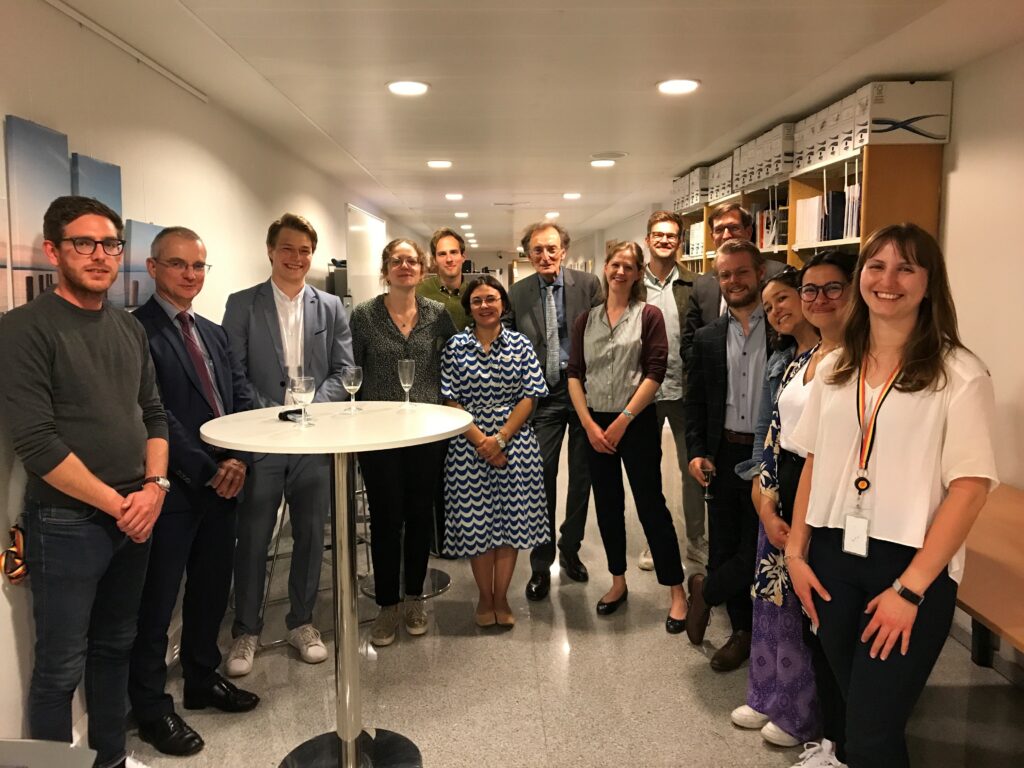On a beautiful, sunny day in early May, I stepped out for some fresh air, an EU policy study tucked into my bag, and headed to the park to do some reading. As I sat trying to brush up on the regulations governing eCommerce and digital services, a group started playing frisbee on the lawn. As they chatted and called to each other, my brain tried to make a quick distinction: were they speaking German or Dutch?
This exercise is a frequent occurrence in my walks and outings in Brussels. The presence of the Belgian government, which has three official languages; the EU, which uses twenty-four; and NATO, with many native tongues spoken in addition to the official French and English, leads to a remarkable linguistic mosaic across the city. At my favorite local épicerie – where you can stock your pantry with European goodies or pick up all sorts of prepared foods – I recently waited to order a sandwich while the Spanish-speaking family ahead of me used French and English to ask about the menu. Brussels, however, is not limited to European languages: there are more native Arabic speakers than there are native Dutch. And, walking through certain Brussels neighborhoods, I’ve undoubtedly overheard several languages of sub-Saharan Africa, even if I couldn’t recognize them. In fact, a 2020 survey estimates that 104 languages are spoken across 180 nationalities in the Brussels Capital region.

In the think tank where I work, my colleagues, who are all bi- or trilingual in English, French, and/or Dutch, kindly conduct their meetings with me in English, while often switching into a native language to chat with each other. When I step from home or the office, my brain prepares itself for interactions in French. Not the most loquacious interactions, but French nonetheless. Among these are my semi-regular visits to a great Belgian culinary institution: no, not the frites stand, but what I’ve dubbed the Chicken Truck: a glamorous, shining rotisserie on wheels, coming to a weekly market near you. There, I’ve managed to order my chicken, roast potatoes, and vegetables many times in French. Yet I was still surprised the day I visited the truck with my boyfriend and, when he asked me a question, the lady at the counter answered in English. It seems the presence of such an array of native tongues has made the city particularly accommodating to the non-Francophone or Dutch speaking among them.

I’ve never lived anywhere else where playing “Name That Language” is such a constant activity. While it gives Brussels a particularly cosmopolitan flare, the presence of so many languages has also offered opportunities for introspection. Walking around town, even a busy shopping street, I can be alone with my thoughts and my experience, taking in the city and the people-watching until a familiar language or phrase cuts through the noise.
One evening, waiting for my bibimbap at a Korean take-away restaurant, I overheard French that sounded as non-native as mine, spoken by the young man ordering after me. Waiting for our meals, the only people in the small storefront, I took a gamble: “You don’t speak French either.” “I’m learning” he laughed, in a clearly Irish accent. He worked in what was, to me, a quintessential EU job – public affairs for agricultural policy. Thank goodness Ireland is still in the EU, if for no other reason but that English remains an official language of the union. Still, I realized how many fewer occasions I have found in Belgium to strike up friendly conversations, as you might in the grocery line or waiting for a walk light. That evening, I had a hunch we’d find a lingua franca – but it may not always be the case.
The week I arrived in Brussels, I headed straight to the neighborhood pizza place. It was a safe bet that not only would I find a good meal, but also that I would be able to communicate properly, since I speak Italian. I joked to my friend – “Maybe I will only eat at Italian restaurants this year, just so I can avoid speaking French.” But, of course, that is not what I have done, and although I am not a confident French speaker, I don’t avoid it either. Still, ringing up my local pizzeria for a pizza margherita is not only a chance for comfort food but for comfort language.
Living in Brussels has helped my French modestly improve. But more than that, I’ll take home the lesson on language and identity. Brussels has revealed my own assumptions. When home in the States, I would walk around town and expect the people I pass on the street to speak English like me. But here, I’m distinctly aware that my fellow commuters, shoppers, joggers, and neighbors could be from almost anywhere. And indeed, this is a common mentality in Brussels – people are usually surprised to meet someone who is a native bruxellois. Returning home, I’ll look forward to more impromptu chats with strangers. I’ll probably play fewer rounds of “Name That Language.” But I think when I do either, I’ll have fewer preconceptions about the person and the language I encounter.

Susanna Sprague received a Fulbright Schuman scholarship for 2021-2022 to research European policymaking for the digital age. Based at the Egmont Institute in Brussels, she examined opportunities and obstacles to EU regulation of established and emerging digital technologies and the creation of a European Digital Single Market. She is interested in the diverse perspectives of states, industry and public opinion and their policy implications. Susanna holds a master’s degree from the Johns Hopkins School of Advanced International Studies and a bachelor’s degree from Connecticut College.
Articles are written by Fulbright grantees and do not reflect the opinions of the Fulbright Commission, the grantees’ host institutions, or the U.S. Department of State.
